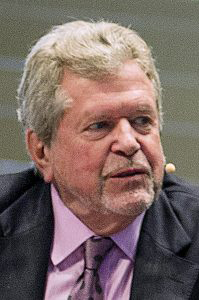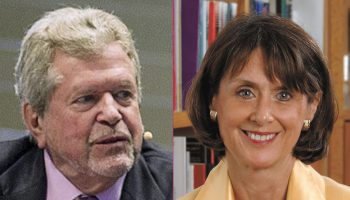On Monday, Geoffrey Kemp, senior director of Regional Security Programs at the Center for the National Interest, hosted Nikolas Gvosdev, professor of national security affairs at U.S. Naval War College, to discuss Russia’s involvement in the region for the first Middle East Update.

Kemp said a lecture about Russia’s involvement in the Middle East was appropriate because of the Week Four theme, “Russia and the West,” but there is also more to talk about this year.
At 3:30 p.m. Wednesday, Aug. 8, in the Hall of Philosophy, Kemp and former U.S. ambassador Dennis Ross will deliver the second Middle East Update of the season, touching on current affairs in the region outside of Russian intervention.
“Ross has been a Middle East envoy for various presidents over the years,” Kemp said. “He has a very good feel for Israeli and Arab politics.”
Kemp will act as “facilitator” during the lecture, offering an introduction and then allowing the guest speaker, Ross, to do most of the talking. Kemp hopes to get Ross’ take on matters such as the United States pulling out of the Iran nuclear deal and moving the U.S. embassy to Jerusalem.
Ross and Kemp both said there are various issues to cover in the second Middle East Update. In May, the United States pulled out of the Iran nuclear deal. The agreement was between Iran and the United States, Russia, Germany, France, China, the United Kingdom and the European Union. It stated that Iran would slow its nuclear activities; in exchange, those countries would lift economic sanctions on Iran.

Now a counselor and the William Davidson Distinguished Fellow at the Washington Institute for Near East Policy, Ross argued in a May article for Foreign Policy that President Donald Trump broke the Obama-era Iran policy and now must fix it.
“Whatever else Trump’s withdrawal from the Iran deal may mean, one thing is clear: He has shattered the Obama-era approach to Iran and Trump now bears full responsibility for whatever Iran does going forward,” Ross wrote. “If Iran is able to threaten the region’s stability by expanding its military footprint or resuming its nuclear program, it will be up to the Trump administration to show it has a policy for blunting both.”
The first of the U.S. sanctions on Iran were set to be reinstated early Tuesday morning, and prohibit Iran from using U.S. currency for any “international financial transactions and oil purchases,” according to The Washington Post. Although economic sanctions are not the “root cause” of Iran’s economic instability, according to Ross, he told Business Insider they will now deal a huge blow to Iran’s trading with countries like China and India.
In a Monday article for Business Insider, Ross said Iran has been struggling economically for years because of governmental corruption and isolation from international business standards, among other issues. The value of Iran’s currency, the rial, has depreciated by half compared to the U.S. dollar this year alone.
“In the past week, the price of toothpaste has risen three times,” Ross told Business Insider.
Aside from the situation with the Iran nuclear deal, U.S., British and French forces have executed airstrikes to destroy the Syrian government’s chemical weapons supply. Syria has been at civil war since 2011, with more than 12 million Syrian citizens — half the country’s population — displaced since the start of the conflict.
Ross said he’ll also cover the Israeli-Palestinian conflict. Throughout the 20th and 21st centuries, thousands of people have been killed in the ongoing violence that has erupted on the Gaza Strip. Followers of Judaism and Islam both consider the strip to be rightfully theirs, leading to several wars and conflicts.
Although there’s much to talk about regarding the Middle East, Ross hopes people will take away a better understanding of the current affairs in the entire region.
As a former U.S. ambassador, Ross has been involved with current affairs in the Middle East since the 1990s. Working with former Presidents George H.W. Bush and Bill Clinton, Ross was instrumental in helping the Israelis and Palestinians reach the 1995 interim agreement on the West Bank and Gaza Strip — commonly known as the Oslo II Accord.
More recently, Ross has worked with former President Barack Obama as a special adviser on the Middle East. He is the author of Doomed to Succeed: The U.S.-Israel Relationship from Truman to Obama; Myths, Illusions, and Peace: Finding a New Direction for America in the Middle East; and other works.
Ross has previously visited the Institution as a speaker on both the morning lecture and special lecture platforms. He has spoken about the Israel-Palestine conflict, current affairs in Jerusalem and other topics related to the Middle East.
“What I enjoy most about speaking at Chautauqua is the setting,” Ross said. “You always have an audience that is genuinely interested and genuinely curious. You speak to an audience that wants to understand what you’re talking about.”




